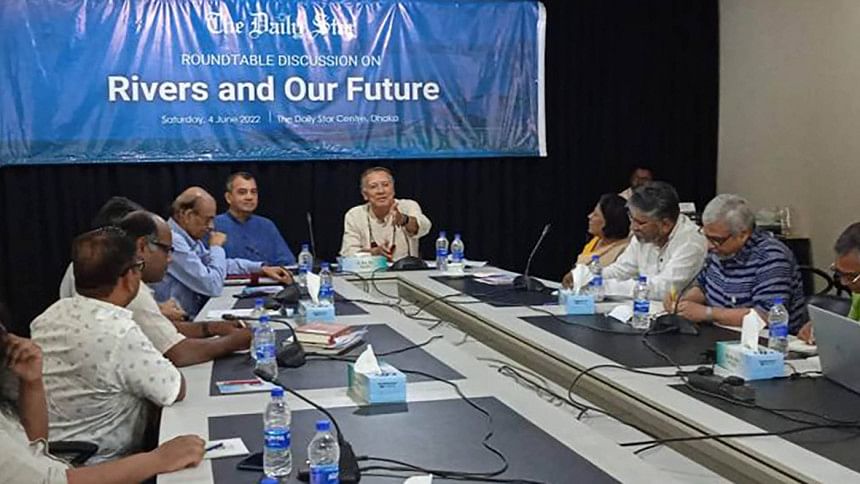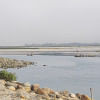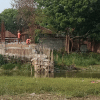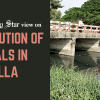Execution of law, accountability essential to save rivers: Speakers

Ensuring accountability of government agencies in-charge of conserving rivers, empowering National River Conservation Commission (NRCC), enhancing the institutional capacity, and executing concerned laws with political commitment are some of the essential factors to save the country's rivers, speakers in a roundtable discussion have said.
Speakers came up with the observation at a roundtable discussion titled, "Rivers and Our Futures", organised by The Daily Star at The Daily Star centre in Dhaka today (June 4, 2022).
Lawmakers, academics, lawyers, river activists, government officials, and journalists participated in the event.
Saber Hossain Chowdhury, chairman of parliamentary committee relating to Environment, Forest and Climate Change Ministry said the approach is important. "How would we tackle the issue of rivers? Is it mere waterbody or it is integral to development and wellbeing?"
He said if they answer it properly, then the rest of alignment of other issues will naturally appear. The political commitment, spirit and honesty all come from this approach.
"Had we accepted or realised the issue (environment) from that approach (wellbeing), rivers wouldn't have been encroached the way they are. At least 1,65,000 acres of forest would not have been leased out, 2, 40,000 acres of forestland would not have been grabbed, if we adopted the approach towards environment," he said.
Saber Hossain attributed it to the lack of political understanding.
"There is huge conceptual gap here. Article 18 of the constitution to conserve environment was placed in light of the fundamental principles of state policy. All the laws the government will enact has to be formulated through the lens of that article," he said.
"How much have we been able to do so? If we can't reach that point, the gap and problem we are talking about will exist," he added.
Setting apart the death caused by coronavirus, he said that the air pollution alone takes live of two lakh people in the country and the tobacco consumption kills 160,000 people a year. "How much are we doing to conserve environment in the wake of such deaths."
Mahfuz Anam, editor of The Daily Star, said many voices were raised, many media including them wrote a lot to save rivers but he did not see any dramatic change.
"I was ecstatic to the best of my knowledge when court issued the directive to demarcate the rivers thinking it was an epoch-making directive for the conservation of rivers. In reality, we saw it appeared as curse instead of a blessing, as the demarcation pillar made the grabbing legalised," he said.
Mahfuz Anam said The Daily Star would continue to fight for the rivers as it waged the fight earlier.
Asif Nazrul, professor of Law Department at Dhaka University, said the gap they identified 21 years ago in the environmental law is still prevalent. Department of Environment (DoE) has been given enormous power without accountability. The scope for people to file lawsuit has been stripped of. Huge legal development we saw since then. The River Commission was formed. The court declared the river as living entity.
"This sounds soothing to hear. But the actual situation on the ground did not vary. No matter how fine the law is, if basic premise of law is fragile, the law will fall flat."
He said DoE officials can't take any action as the officials, who took action against polluters during caretaker government in 2007, were being made OSD.
Muzibur Rahman Howlader, former chairman of National River Conservation Commission (NRCC), said had the government agencies that are in charge of river conservation taken minimal action, the rivers would not be devastated to this extent.
He experienced reluctance from the secretary level of administration during his tenure in NRCC.
"I visited 30 districts, prepared the list of grabbers where the name of powerful people surfaced, and many recommendations were made. All went unheard. Those who were in-charge of conservation of river must be held accountable, if we want to save rivers", he said.
He also urges the government to increase institutional capacity and empower the NRCC to protect rivers.
Malik Fida A Khan, member of NRCC, said to make the rivers free from pollution, and to keep navigability in transboundary rivers, Bangladesh must have directions in light of regional perspective, and form river basin organisation.
He also suggested the river pollution be included in the textbook for awareness.

 For all latest news, follow The Daily Star's Google News channel.
For all latest news, follow The Daily Star's Google News channel. 








Comments